Home Beyond the Sun
Reviewed by: Michael Karounos
CONTRIBUTOR
| Moral Rating: | Good |
| Moviemaking Quality: |
|
| Primary Audience: | Adults Family Christians |
| Genre: | Drama |
| Length: | 1 hr. 20 min. |
| Year of Release: | 2004 |
| USA Release: |
February 20, 2004 |
| Featuring |
|---|
|
Melyssa Ade Molly Sayers Mung-Ling Tsui Von Flores Stan Coles |
| Director |
|
Colin Chilvers |
| Producer |
|
Garden City Pictures [Canada] |
| Distributor |
Home Beyond the Sun takes place in present day China and narrates the experiences of a Bible college student who goes there to teach English for a semester. While there, Jenna (Melysse Ade) meets an eight-year-old Chinese orphan, Chu Lee (Molly Sayer). In the movie’s opening flashback, we learn that Chu Lee’s mother gave birth to her out of wedlock and without a birth license. Her father reported her to the state apparatus who, when they come to arrest the mother, unnecessarily kill her with a rifle from close range. Chu Lee is left in the care of a private orphanage and the story then picks up eight years later when Jenna arrives in China.
The movie is earnest in its attempt to inform us about the persecution of Christians in China, about the plight of unwanted children languishing in orphanages, and about the practical value of living life and making decisions based on a Christian worldview. The characters encourage one another to “trust in God,” remind each other of the “power of prayer,” to desire “what God wants,” and to realize that we’re all “a part of God’s plan.” Curiously, with the exception of a reference to Psalm 23 (and possibly a nod to Psalms 10:12), there are no quotations from scripture or even references to key scriptures. I don’t think this is a major fault, just an interesting gap in the context of an openly Christian film.
It would be easy to criticize a movie like this on formal grounds, but it would only reveal a reviewer’s bias for privileging form over content. To be charitable, the film does not meet the Hollywood production standards we’ve all become accustomed to. Although the movie appears to be filmed in digital video, it has that home-movie, soap-opera look that undermines its credibility. This is not a terrible fault, just a stumbling block for viewers accustomed to the lush aesthetics of big budget Hollywood films.
While I can’t recommend it on the basis of its filmic quality, I believe it can be a valuable instrument for instruction in Christian elementary schools, in home schools, and in Christian homes. For children under the age of 12, the movie teaches that life isn’t about video games, soccer matches, and mall mashing. It is important for young Christian children to see that in some countries, the mere ownership of a Bible gets you roughly handled and hauled off to prison. They will learn that prayer sometimes must be done in one’s “closet” (Matthew 6:6), because the alternative is arrest, social stigmatization, and poverty resulting from a criminal record that precludes employment in any meaningful line of work.
Children belonging to intact, nuclear families will gain insight into the pain of being an orphan, as both Chu Lee and Jenna are for much of the movie. More importantly, they will learn that even orphans have a Father who loves them, speaks to them through His word, and answers their faithful prayers in accordance with his “perfect and pleasing will” (Romans 12:2 NIV).
Additionally, the movie serves a useful purpose in publicizing the plight of China’s estimated 110,000 orphans, at least some of whom are available for adoption. Adoption is a wonderful opportunity for Christians who can’t have children of their own, or for those who would like to have an additional child. The movie’s mission, in part, is to convert the forsaken orphans to the status of the what the movie calls the “found forsaken” by sharing the temporal wealth of this fortunate land and the eternal riches of a life lived in communion with Jesus Christ.
In an era when multicultural values are co-opting Christian values, and group identity trumps individual identity, American Christians need to stretch their cultural limits and bring the world to them if they themselves can’t go out into the world, as young people like Jenna do. Adopting a child from China or Africa or Eastern Europe is one godly way to give something back to God and to rescue a child from the loveless horrors of institutionalized existence, to say nothing of disease, poverty, and various kinds of abuse.
“Home Beyond the Sun” has no objectionable elements and is a movie whose greatest utility is for teaching young Christians about the world outside of their own circumspect lives.
Violence: Minor / Profanity: None / Sex/Nudity: None


Moral rating: Excellent! / Moviemaking quality: 2½
I have three complaints about the movie. One, almost all of the movie takes place in China, but no one speaks Chinese. Mel Gibson’s “The Passion…” was annoying because it was filmed entirely in foreign languages; this film should have featured some Chinese with English subtitles, especially when the Chinese characters communicated with each other.
Second, the film had this made-for-home video feel to it. It was painfully obvious that it was a low budget production, saved almost entirely by Ms. Ade’s performance. (She has came a long way since portraying Janessa in “Jason X.”)
Finally, the ending was just unbelievable. In real life—even when God is totally in control—things are never wrapped up as neatly as when Chu Li and Jenna become sisters.
Overall, it was a compelling story, with a fine performance by the lead actress, but a poor production from Collin Chivers—an award-winning Christian film-maker. “Home Beyond the Sun” could have and should have been so much more.
[Excellent!/2]
Moral rating: Extremely Offensive / Moviemaking quality: ½
PLEASE share your observations and insights to be posted here.
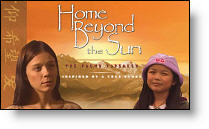
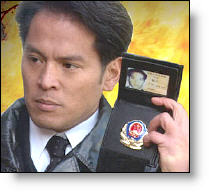
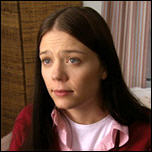
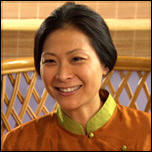
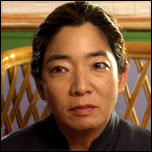



My Ratings: Moral rating: Excellent! / Moviemaking quality: 2½